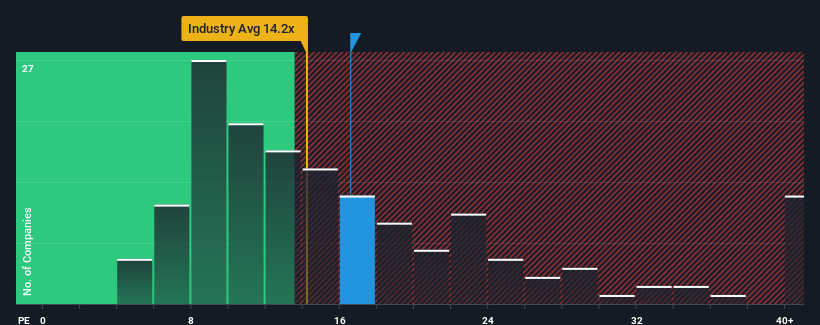- Japan
- /
- Electronic Equipment and Components
- /
- TSE:6962
Daishinku Corp.'s (TSE:6962) Price Is Out Of Tune With Earnings
When close to half the companies in Japan have price-to-earnings ratios (or "P/E's") below 14x, you may consider Daishinku Corp. (TSE:6962) as a stock to potentially avoid with its 16.6x P/E ratio. Although, it's not wise to just take the P/E at face value as there may be an explanation why it's as high as it is.
Daishinku could be doing better as its earnings have been going backwards lately while most other companies have been seeing positive earnings growth. One possibility is that the P/E is high because investors think this poor earnings performance will turn the corner. If not, then existing shareholders may be extremely nervous about the viability of the share price.
See our latest analysis for Daishinku

How Is Daishinku's Growth Trending?
There's an inherent assumption that a company should outperform the market for P/E ratios like Daishinku's to be considered reasonable.
Taking a look back first, the company's earnings per share growth last year wasn't something to get excited about as it posted a disappointing decline of 62%. Regardless, EPS has managed to lift by a handy 11% in aggregate from three years ago, thanks to the earlier period of growth. Although it's been a bumpy ride, it's still fair to say the earnings growth recently has been mostly respectable for the company.
Looking ahead now, EPS is anticipated to slump, contracting by 1.9% during the coming year according to the three analysts following the company. Meanwhile, the broader market is forecast to expand by 11%, which paints a poor picture.
With this information, we find it concerning that Daishinku is trading at a P/E higher than the market. Apparently many investors in the company reject the analyst cohort's pessimism and aren't willing to let go of their stock at any price. Only the boldest would assume these prices are sustainable as these declining earnings are likely to weigh heavily on the share price eventually.
The Key Takeaway
It's argued the price-to-earnings ratio is an inferior measure of value within certain industries, but it can be a powerful business sentiment indicator.
Our examination of Daishinku's analyst forecasts revealed that its outlook for shrinking earnings isn't impacting its high P/E anywhere near as much as we would have predicted. Right now we are increasingly uncomfortable with the high P/E as the predicted future earnings are highly unlikely to support such positive sentiment for long. This places shareholders' investments at significant risk and potential investors in danger of paying an excessive premium.
It's always necessary to consider the ever-present spectre of investment risk. We've identified 3 warning signs with Daishinku, and understanding them should be part of your investment process.
If you're unsure about the strength of Daishinku's business, why not explore our interactive list of stocks with solid business fundamentals for some other companies you may have missed.
New: Manage All Your Stock Portfolios in One Place
We've created the ultimate portfolio companion for stock investors, and it's free.
• Connect an unlimited number of Portfolios and see your total in one currency
• Be alerted to new Warning Signs or Risks via email or mobile
• Track the Fair Value of your stocks
Have feedback on this article? Concerned about the content? Get in touch with us directly. Alternatively, email editorial-team (at) simplywallst.com.
This article by Simply Wall St is general in nature. We provide commentary based on historical data and analyst forecasts only using an unbiased methodology and our articles are not intended to be financial advice. It does not constitute a recommendation to buy or sell any stock, and does not take account of your objectives, or your financial situation. We aim to bring you long-term focused analysis driven by fundamental data. Note that our analysis may not factor in the latest price-sensitive company announcements or qualitative material. Simply Wall St has no position in any stocks mentioned.
About TSE:6962
Daishinku
Engages in the manufacture and sale of electronic components and equipment in Japan, North America, Europe, China, Taiwan, and Asia.
Excellent balance sheet with reasonable growth potential.
Similar Companies
Market Insights
Community Narratives



